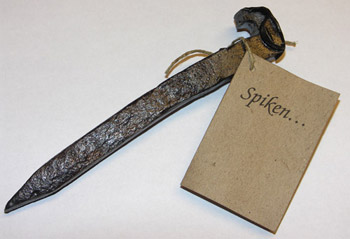The Weight of Autumn
My non-blogging has been haunting me again lately: haunting being appropriate to the season. The original purpose of this blog, to reflect on my reading for research and writing purposes, remains, but the research itself is hampered by other responsibilities. That’s the way it is in this job, always: there is always something more important to do than to care for the important things.
The dreariness of these sentiments has lately been matched by the expected, and late, changing of the season here in the Northeast. Friends in my previous Northeast have told me it is similar, but worse, there: we have rain and more rain, they have snow made leaden by rain.
Thank goodness for the Beeb. This afternoon I got to listen to Radio 4’s “Poetry Please” – if you follow the link, you can listen to the current week’s show on the internet. Two beautifully read poems well-captured my mood today and gave me a severe optimism for the shorter and colder days to come. One was from Emily Bronte:
Fall, leaves, fall; die, flowers, away;
Lengthen night and shorten day;
Every leaf speaks bliss to me
Fluttering from the autumn tree.
I shall smile when wreaths of snow
Blossom where the rose should grow;
I shall sing when night's decay
Ushers in a drearier day.
The other lovely poem is “The Burning of the Leaves,” by Laurence Binyon. This poem seized me on so many levels: personally (“Now is the time for stripping the spirit bare”), politically and socially (“The world that was ours is a world that is ours no more”), ecologically (“Earth cares for her own ruins, naught for ours”).
Now is the time for the burning of the leaves,
They go to the fire; the nostrils prick with smoke
Wandering slowly into the weeping mist.
Brittle and blotched, ragged and rotten sheaves!
A flame seizes the smouldering ruin, and bites
On stubborn stalks that crackle as they resist.
The last hollyhock’s fallen tower is dust:
All the spices of June are a bitter reek,
All the extravagant riches spent and mean.
All burns! the reddest rose is a ghost.
Spark whirl up, to expire in the mist: the wild
Fingers of fire are making corruption clean.
Now is the time for stripping the spirit bare,
Time for the burning of days ended and done,
Idle solace of things that have gone before,
Rootless hope and fruitless desire are there:
Let them go to the fire with never a look behind.
That world that was ours is a world that is ours no more.
They will come again, the leaf and the flower, to arise
From squalor of rottenness into the old splendour,
And magical scents to a wondering memory bring;
The same glory, to shine upon different eyes.
Earth cares for her own ruins, naught for ours.
Nothing is certain, only the certain spring.
Binyon’s near contemporary would have been Antonio Gramsci and there is really no particular reason to link them except for Gramsci's famous, if clichéd, maxim: optimism of the will, pessimism of the intellect. Binyon lets me grip the pessimism of the season because he reminds me that the wheel keeps turning: “That world that was ours is ours no more./They will come again, the leaf and the flower, to arise…”
I think these two poems will be echoing in my head at least until the winter solstice here, when the sun sets around 3:30 in the afternoon and the hardest part begins, made easier by noticing that each day we get about 4 more minutes of sunshine than we had the previous day. Then poems more suited to the warming of the spirit should spring up with the sap and snowdrops.

